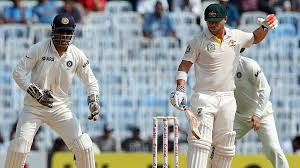
Chennai, Feb 23(PTI): Australia were all out for 380 in their first innings at lunch on the second day of the first cricket Test against India, here today.
With the wicket of Nathan Lyon, the umpires declared the lunch break after an extended morning session.
Brief Scores:
Australia 1st innings : 380 all out in 133 overs. (Michael Clarke 130; M Henriques 68; R Ashwin 7/103, R Jadeja 2/71).

Ind vs Aus: Australia resume batting on Day 2 of first Test
New Delhi, Feb 23(TNN): Skipper Michael Clarke and Peter Siddle resumed batting, after Australia finished Day 1 at 316/7, against India on the second day of the first Test of the four-match series at the MA Chidambaram Stadium in Chennai on Saturday.
Australia would now look to score as many runs as possible on Day 2, with Clarke and Siddle ready to carry on the battle for Australia.
Any total in excess of 350 could prove to be challenging for the Indians as the ball is getting roughed up quickly on a bone dry surface.
Earlier on Friday, Clarke led from the front with a sparkling unbeaten century under pressure as Australia recovered from a precarious position to post a respectable 316 for seven on the opening day.
Clarke brought up his 23rd Test century off the second last ball of the day hitting left-arm spinner Ravindra Jadeja towards long-off to remain unbeaten on 103 on a day which saw an engrossing battle between the bat and the ball.
Clarke negated all the good work done by off-spinner Ravichandran Ashwin (6/88) who took all but one among seven wickets that fell on the day at the Chepauk.
Clarke was well-complemented by debutant Moises Henriques (68) as the pair added 147 runs for the sixth wicket after Ashwin's terrific post-lunch spell saw the visitors being reduced to 153 for five.
The Tamil Nadu offie finally broke the partnership by dismissing the impressive Henriques, trapping him leg-before much to the relief of his teammates.
Ashwin, who took his sixth five-wicket haul in Test matches ended with fantastic figures of six for 88 in 30 overs but should consider himself unlucky being robbed off Clarke's wicket due to the absence of Decision Review System (DRS).
The Australian captain was batting on 39 when he offered a simple bat-pad catch to Cheteshwar Pujara at forward short-leg but umpire Kumar Dharmasena turned down the vociferous appeal from the Indians.
A lot was expected of Harbhajan Singh playing his 100th Test match but the experienced off-spinner went off the boil after the first few overs giving away 71 runs in 19 overs.
Debutant Bhuvneshwar Kumar's performance also left a lot to be desired. With a pace of about 130 kmph, he could hardly pose much problems for Clarke and Henriques.
In all three sessions, the Australian batsmen maintained a decent run-rate despite losing wickets at regular intervals.
Skipper Clarke responded to the crisis situation quite well as he batted with a lot of authority. His footwork was assured and he decided to wait for the loose deliveries hitting as many as 11 fours and a six.
The six off Ashwin over long-on was majestic as it brought up his half century. Clarke also completed 7000 Test runs on the day, when he reached a personal score of 11.





Comments
Add new comment